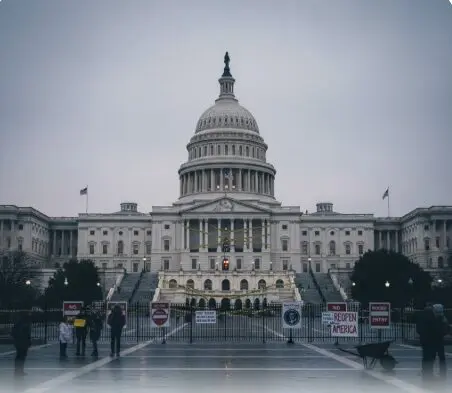When the federal government goes into paralysis because Congress fails to approve funding, the effects reach far beyond Washington. The real economy feels the shock first: over-the-road truckers, logistics networks, and the millions of jobs tied to freight and transportation are among the most immediately affected.
A shutdown occurs when Congress fails to approve funding on time to keep federal agencies operating. Put simply: the government spends so much that it must continually authorize its own survival.
This year, disagreement between Democrats and Republicans over subsidies and social spending has once again brought the nation to a budgetary standstill. According to the Congressional Budget Office (CBO), nearly one million federal employees are currently without pay or have been furloughed.
Meanwhile, truckers continue to pay for fuel, tolls, and insurance — ensuring the country keeps moving even when the federal government does not.
The government shuts down; the private economy does not.
Truckers: The First to Feel It, the Last to Complain
During every shutdown, the Department of Transportation (DOT) and the Federal Motor Carrier Safety Administration (FMCSA) maintain only their essential services. Licensing renewals, permits, and audits are suspended, though roadside inspections continue.
This means that drivers are still being checked and penalized, even while the state fails to perform its own administrative duties. The bureaucracy sleeps, but the law does not.
Truckers are not asking for subsidies. They ask for safe highways, affordable fuel, and clear rules. Yet when politics overrides work, the outcome is always the same: more red tape, more delays, and higher costs.
The Supply Chain Pays for Washington’s Mistakes
The shutdown also affects ports, customs, and federal contracts. While essential agents remain at their posts, thousands of administrative employees do not. The result is longer wait times for shipments, reduced efficiency, and financial losses across the logistics sector.
During the 2018–2019 shutdown, average container dwell time in California ports increased by up to 20 percent, according to Logistics Viewpoints. Today, business leaders fear a similar scenario.
In addition, thousands of infrastructure projects financed with public funds have been put on hold. The American Road and Transportation Builders Association (ARTBA) has warned that if the shutdown continues, tens of thousands of construction and transportation workers could face temporary layoffs.
In short, while Washington debates how to spend more, the country’s real work comes to a halt.
The Cost of Statism: Getting Paid Without Producing
The Government Employee Fair Treatment Act guarantees that federal workers will receive back pay once the government reopens. In other words, even when the government is closed, its employees still get paid — eventually.
But the trucker who misses a delivery doesn’t get paid.
The small carrier who can’t bill a client might not survive.
The business owner waiting on a federal contract has to keep waiting.
The state lives on the taxes of the productive class — and when it stops, it is that same productive class that ends up footing the bill.

The Uncomfortable Truth: The Country Doesn’t Depend on Washington
Every government shutdown exposes a truth many prefer to ignore: America doesn’t depend on Washington — Washington depends on America.
Truckers, farmers, business owners, and logistics workers do not need the machinery of the state to produce. What they need is for the government to stop getting in the way.
A nation is not built through decrees or subsidies, but through the work, investment, and risk-taking of its people. While politicians argue over endless budgets, the real country keeps moving — without breaks, without holidays, and without privilege.
Learn from the Truckers
If bureaucrats worked with half the effort, discipline, and punctuality of an American truck driver, the United States would never experience a shutdown.
While the federal government “powers down,” truckers power up their engines every morning. And while Washington argues over who is to blame, across America’s highways the real workers — the ones who deliver, build, and sustain the nation — keep doing what they’ve always done: work, produce, and keep the country afloat.

$170 billion at stake: 1,500 companies demand tariff refunds
Companies have challenged the global tariffs imposed by President Donald Trump, asking federal courts to reactivate proceedings to begin the refund process. The companies that

In brief: enforcement measures target speeding, CDL training gaps and more
Major enforcement actions across the U.S., including speeding, CDL fraud, and chain violations Colorado launches Speed Enforcement Program The Colorado Department of Transportation (CDOT) has

Chinese Vehicles Raise Espionage and Remote Sabotage Concerns
Investigations into Chinese technology in connected vehicles warn of espionage risks, massive data transmission, and potential remote access vulnerabilities that concern U.S. transportation and security

Between the Court and the Fed: the market redefines its roadmap for 2026
Trade policy in limbo as markets price in 2026 rate cuts and Supreme Court strikes down Trump tariff plan. In the latest episode of the

New 10% U.S. import tariff takes effect amid legal and market uncertainty
The implementation of these new tariffs has generated global uncertainty among exporters, increasing confusion around U.S. trade policy. The United States has implemented a new

Military Trucks That Moved a Base in Syria
Convoys of advanced HEMTT and PLS military trucks carried armored vehicles, prefabricated base structures, mobile workshops and heavy equipment during the U.S. withdrawal from northeastern
